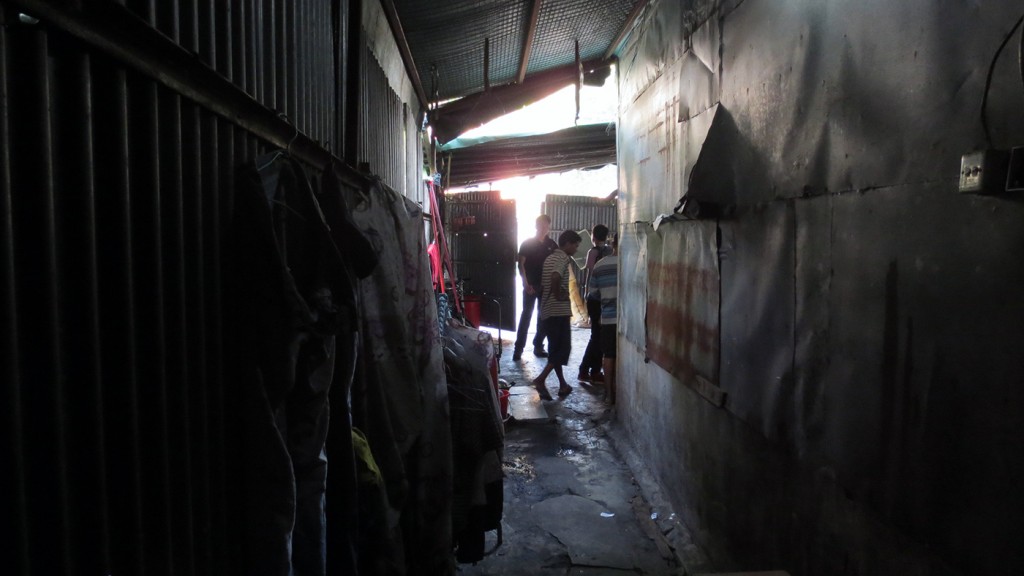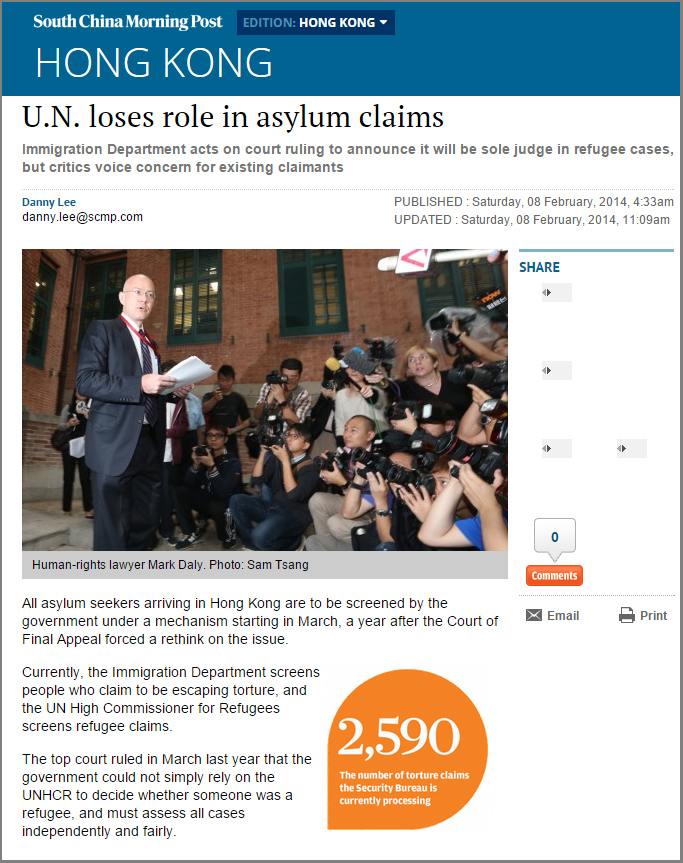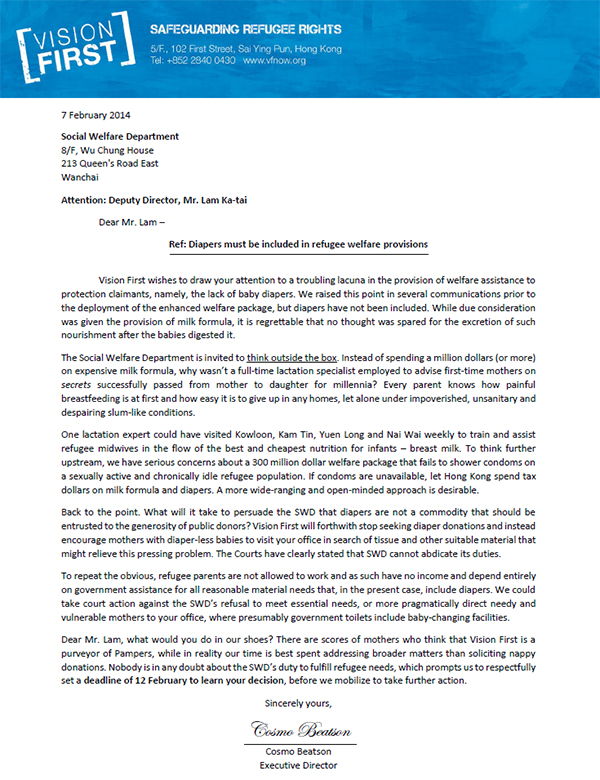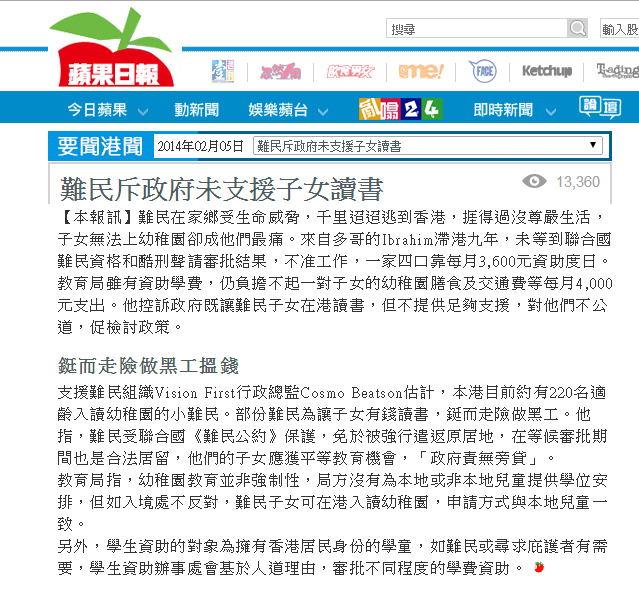Archive
Refugee Union demands ISS display food prices
Feb 11th, 2014 | Advocacy, Food, Refugee Community | Comment
Second meeting of the Refugee Union on 10 February 2014
Feb 10th, 2014 | Advocacy | Comment
They were arriving one hour before the meeting started despite no email, blog or SMS reminders. The news had spread by word-of-mouth: here is a Union that seeks justice and protection, here is an association that fights for the rights, dignity and future where these are denied in contravention of the law. Refugees in Hong Kong thirsted for justice since they were first locked up in the grim Victoria Prison around 2000 – always unlawfully and often for more than a year!
There was a palpable feeling in the air that despair and anger are at last positively channeled. What people failed to achieve individually year after year, might be possible with collective power. Nothing comparable has ever been attempted in Hong Kong and it can only be achieved today after a gradual buildup in confidence and leadership in 2013. Vision First is proud to have prepared fertile ground.
Nationals from a dozen countries participated in the Refugee Union’s second meeting, including old-timers who hadn’t bothered with gatherings for many years, due to disillusionment with civil society. Participation was remarkably strong and it was standing-only space in the room. Galvanizing energy united these men and women who have been sidelined in the community as hopelessly irrelevant.
The first order of the day was the election of country leaders, an exercise in spontaneous democracy that was unexpectedly smooth among such a diverse, strong-minded individuals. The leaders will be supported by two assistance and the three will participate in Refugee Union meetings to report decisions and actions to their community. Gatherings larger than this won’t be possible in future.
It was unanimously agreed that the Union’s longterm goal is to campaign for the Right to Work. There is no dignity in a life deprived of employment rights, particularly when raising a family. Idleness could be enforced for 6 to 12 months, but any longer amounts to outright cruelty. The ‘magnet effect’, if even plausible, does not justify harming human beings who wasted 10 years or longer waiting for the Immigration Department to make a decision: Accept or Reject! What are they pondering over?
Rights barrister, and Vision First non-executive director, Mr. Robert Tibbo was the guest of honor. He entered to a warm applause as everyone was pleased to finally meet him in person. The Refugee Union needs legal grounding. Its formation, agenda and activism must be rooted in law. From the questions asked it was apparent that members want to learn their rights, not just in respect to USM, but also in their daily, and often confrontational, dealings with authorities.
There was a general request for a “Rights Workshop” to be conducted by human rights barristers to ensure that refugees know exactly where they stand in encounters with police, Immigration, case workers and those who serve the community. The Refugee Union will safeguard refugee rights by ensuring that its members are the best informed and know how to confidently handle any eventuality from police search to High Court review.
Many lamented how other NGOs discouraged assemblies and participation of refugees in protest activities. The enemies of justice are well versed in the ancient tactic of “Divide and Conquer”. The Refugee Union will strive to counter this and other defeatist attitudes by empowering each and every individual to rise fearlessly against prejudice and injustice, wherever they appear. The times are changing and nobody is doubts that 2014 will usher in a veritable refugee REFORMATION.
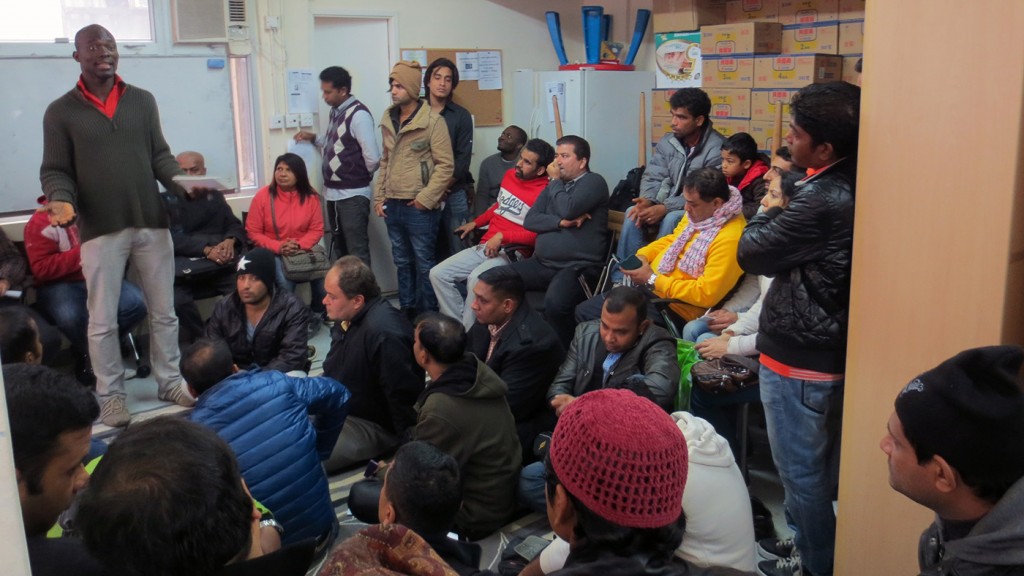
QEH violates rights of the security of the individual
Feb 9th, 2014 | Advocacy | Comment
The following events unfolded yesterday evening (8 February 2014). Samira, a Tamil torture claimant since 2004, was at home throwing up. She had stomach pains and was in great agony. Her two young children were very upset. They were crying. Her husband Raaj became so worried that he decided to take her to Queen Elizabeth Hospital’s emergency room (QEH).
Samira had previously seen a doctors and was prescribed medicines for stomach problems. These had had little effect. Last night Raaj had to leave the kids at home momentarily to rush their mother to hospital. He couldn’t stay with her after she was admitted, but a representative of Be the Change came to assist.
Late last night, Samira informed Raaj over the phone that she had an infection in her fallopian tubes. She was worried and scared. The doctor had called for emergency surgery. However, doctors and nurses refused to speak to either Raaj over the phone, or to the NGO rep who came to assist.
The QEH nurse could not speak English well and tersely said to the NGO rep, “The doctor just explained everything to the patient.” No interpreter was ever called. Nobody paid attention to the NGO rep. The nurses turned a deaf ear to her pleading that Samanti was in great pain and, given such severity was probably unable to comprehend what the doctor had told her.
On instructions from a solicitor firm, a barrister communicated with a Tamil interpreter and the NGO lady on the scene, arranging for an interpreter to visit Samira first thing in the morning. It was late in the evening when Samira went under the knife without any idea what was happening, besides her acute sensations of pain.
This morning at 9am the QEH nurses refused to allow any access to the patient. Upon the interpreter arriving, a nurse said that the doctor had already left. The interpreter informed the nurse that the barrister had asked the interpreter to assist Samira. The interpreter reminded the nurse that it was protocol that an interpreter be immediately called to the hospital when the woman was admitted. At least they should have called one over the phone.
The nurse readily admitted they had made a mistake last night. She then confirmed that they had operated on Samira and she would have to remain in hospital at least for three days. Despite being repeatedly asked, the nurse refused to inform the interpreter and NGO rep exactly what surgery had been undertaken.
Nevertheless the nurse allowed the interpreter to enter the ward and meet with Samira for five minutes. The patient confirmed she did not know what the surgeons had done to her. The only thing she knew was that she had an infection in her tubes. As of today she has no idea what happened and what was said to her last night. She had effectively been compelled to sign documents the content of which she did not understand and had not been interpreted to her.
Under the Bill of Rights and the Basic Law, the government is not to discriminate against individuals based on ethnicity, skin colour, country of origin and, most significantly, on the basis of language. Samira’s rights of security of the individual, meaning not just the physical, but the psychological integrity of the individual, was also fully engaged under the circumstances.
The rights of the security of the individual also extend to Raaj who was kept in the dark and remains in the dark. He was completely traumatized last night having emotionally broken down when he was told that his wife was to undergo unknown surgery. He did not know what was wrong with his wife, what was done to her and the QEH refused to tell him.
Furthermore, the security rights of two minor children were engaged, having witnessed their mother being taken away from their home in severe pain, and the mother not returning home, seeing their father sobbing and traumatized, and not knowing what had happened to their mother in hospital.
It should be noted that even though Samira signed some hospital documents, the NGO rep confirms she was in such pain that there is no way she would have understood their content. Her English is not strong enough and she was writhing in pain, brought to Emergency and dealt with doctors without the assistance of an interpreter. All she understood was that there was something wrong with her tubes.
In third-world countries it is common for emergency surgeons to remove the entire uterus because women lack the money and sophistication to return for follow-up procedures. Vision First is deeply concerned that QEH might have proceeded with invasive surgery to cut or remove organs without the patient’s understanding and express, interpreted consent. After two and a half days the hospital is offering a glimmer of hope that the woman might finally understand what surgical procedures were undertaken on her and why.
One can imagine a Hong Kong woman falling sick in Sri Lanka. She might be taken to hospital to sign documents in Tamil. The hospital might tell her husband in Tamil that doctors will not talk to him. The lady might be aided by a Tamil NGO representative, but kept in the dark. The woman then undergoes major surgery without being explained why, what was removed, whether it was a life-threatening situation. What would Hong Kong government do? Would it ask the Sri Lankan government to apologize and pay lots of money in compensation?
Hong Kong is not a third-world country. Interpreters can be called on the phone at any time, day or night. It was an arbitrary decision not to bother calling one. Refugees are a defined social group that is battered and traumatized by Hong Kong government, often for a decade. They come here for protection and receive none. They entrust their safety and wellbeing to the government and are left in a state of destitution and despair. The authorities need to step up and recognized fundamental refugee rights.
U.N. loses role in asylum claims
Feb 8th, 2014 | Government, Immigration, Media, Rejection | Comment
Police entrap four asylum seeker ladies
Feb 6th, 2014 | Advocacy | Comment
Anissa and three protection claimant girlfriends were arrested mid-January walking in the streets of Lo Fu Shan. Her boyfriend came to Vision First to report the incidents after the police charged them for working illegally despite overwhelming evidence to the contrary. Anissa is Indonesian and has a ten year-old son living with her mother. On that morning, she was bringing a mobile phone for her son to a friend who was flying back to Jakarta.
Dressed in her good clothes (evidence that she was not going to work) and holding her Sunday handbag, Anissa was walking down a public road when the police pounced. It was 10:30 in the morning and this was raid to net illegal workers. Maybe achievement records required a success. Anissa counted sixteen officers swooping down on the street to arrest the four ladies. She was terrified and didn’t understand what was going on and, most importantly, what she had done wrong.
Had Anissa’s friend arrived on time, she wouldn’t have been in the wrong place at the wrong time. Unfortunately her friend was late and her phone was switched off. The ladies might have been guilty of loitering in a public place, but they were certainly not working or coming out of a place of work as the police accused them. Was this misperception … or entrapment?
“Come into the car. You are working!” the officers shouted, pulling them aside. The scared ladies were pushed into a van and threatened with long prison sentences if they denied the charges. Anissa professed her innocence as best she could amid much adrenaline. At the police station there was no interpreter. Her statement was clear, “I was not working. I was meeting a friend”. But nobody listened.
At the police station she pointed out she was wearing good clothes on her way to meet friends. The officers pounded the desk and shouted. She noted there was no evidence. The officers shouted louder to intimidate and one threw a ballpoint pen at her. They wanted her to sign an admission of charges. Anissa’s fear turned into indignation. She had heard about entrapment, but couldn’t believe it was her.
Anissa pointed out that nobody goes in their Sunday clothes to shift garbage in a recycling plant – the only job for refugee ladies. She insisted she was walking around waiting for her friends and had not been inside any compound. The police were out to win! The four ladies were kept in custody without bail and sent to Shatin court to face charges. Undaunted by police threats, they all pleaded not guilty.
The judge didn’t bother to listen to them. The duty lawyer said nothing in the ladies’ defense and made no effort to understand why they insisted on their innocence. Anissa asserted, “I was not working. How can I admit that I was working? The police have no proof because I was only walking on the road”. The four ladies repeated the straightforward facts of that morning: they were on their way to visit friends.
Later, the duty lawyer visited them in Tai Lam prison and asked for evidence of their defense. But how can you prove what you didn’t do? The duty lawyer said the police have proof – now it gets interesting – and they can be jailed for more than 22 months if they don’t plead guilty for a shorter sentence. It appears that the lawyer is seeking an expeditious resolution to avoid a trial in which these ladies innocence could be proven.
Vision First is gathering evidence and preparing to defend these four victims of police entrapment.
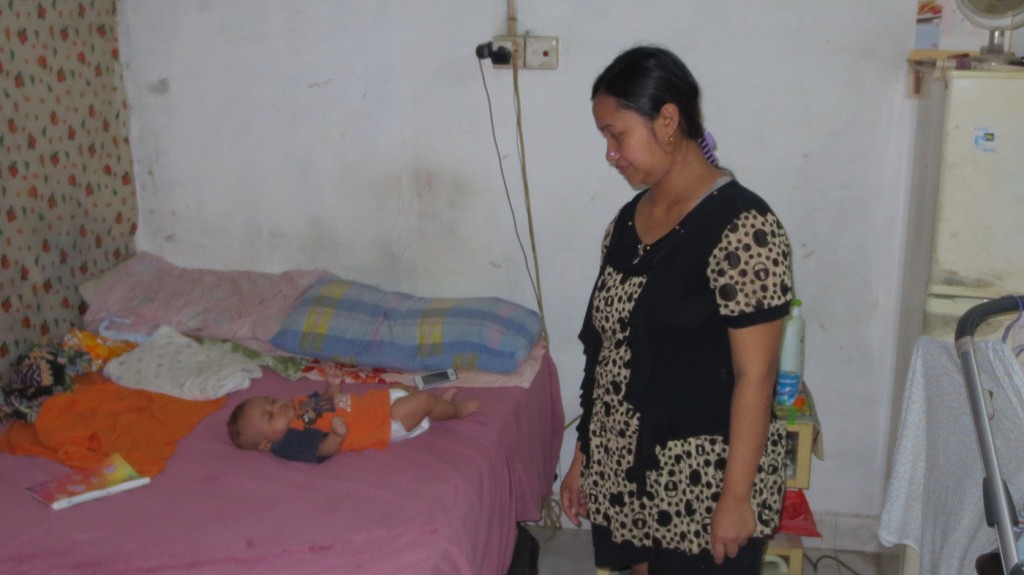
Refugee parents will fight for kindergarten support
Feb 5th, 2014 | Advocacy | Comment
On 23 January, Vision First reported that the government fails to support kindergarten students. The Education Bureau accepts placements for children between the age of 3 and 5 and the Immigration Department makes no opposition, but there is no support. We challenge the logic of allowing the right to school, while denying the ability to so, as destitute refugee parents are jailed if arrested working.
On 28 January, Vision First wrote to the Security Bureau about this shameful situation that appears be both inhumane and illegal since Hong Kong has signed the UN Convention on the Rights of the Child, which rights are enshrined in domestic law. There is a clear disconnect in government policies that hinder access to kindergarten as a misguided strategy to encourage voluntary departures.
There is no other explanation or motive for such an unreasonable policy as Hong Kong cannot turn its back on the crucial education of young children. Taking into consideration that protection claimants are stranded here for years, often stretching into a decade, such punitive policies harm a second generation of refugees that, born in Hong Kong, might in the future enjoy the right of abode when laws change.
On 30 January, Vision First led a delegation of 19 kindergarten children to the Legislative Council for a press conference with lawmaker Fernando Cheung Chiu-hung. The parents voiced their concerns about the lack of financial support which has kindergartens shun refugee applications, worrying that bills will not be paid. An African father, torture case not assessed for 11 years, lamented being disrespectfully rejected by twenty school that had said they had vacancies, before he admitted being a refugee.
Admission clerks inquired how he would pay various fees (at times amounting to 30,000 HK$) and, upon hearing that he had a letter from the government, would become annoyed with him. They would brushing him off and abruptly dismiss him with, “We will call you later”. That never happened on twenty occasions. Apparently skin colour is no concern if you carry bags of money, but the refugee labelling is impossible to overcome. The lack of adequate support exacerbates discrimination against this minority social group.
Legally speaking it’s a no-brainer: the government has a constitutional duty towards impoverished refugee parents and the kindergarten education of their children. Vision First urges the Security Bureau to comply with its obligations and take positive steps towards reformulate a broken policy. Kindergarten students must receive the same support as primary school kids, because the right to education starts when the majority of resident children attend “K1 or K2”.
These and many more parents are determined to fight for the future of their children – their only hope in a grim life of asylum. The ball is now in the government court. The Security Bureau must make the next move: either it reviews an unfair policy, or it encourages all refugee parents to apply for judicial reviews in the High Court, for a result that will surely complies with international treaties and domestic law.
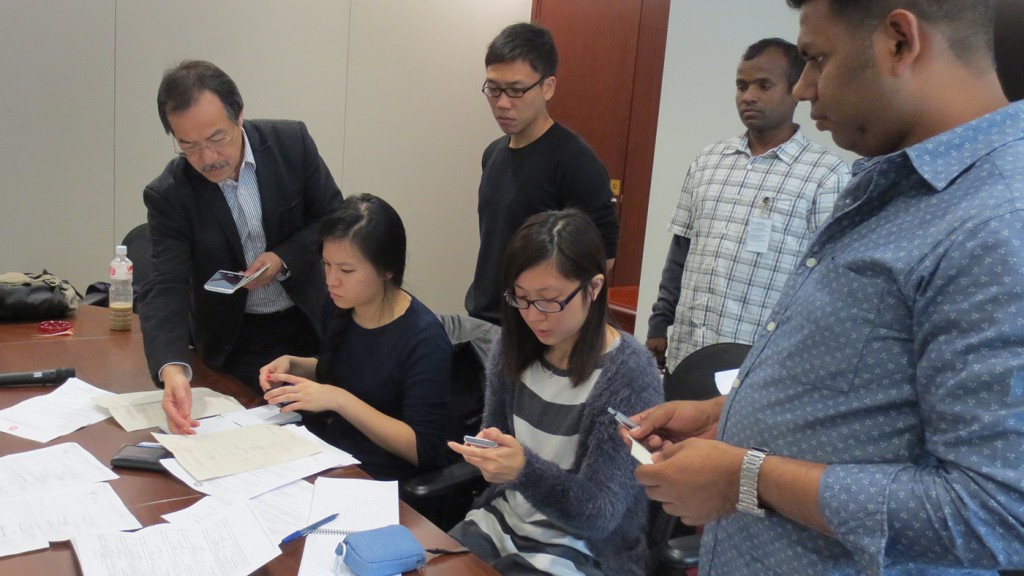
Into the heart of darkness
Feb 5th, 2014 | Advocacy | Comment
The government should be concerned that refugees are succumbing to the pressure of segregation. Ugly forces are taking hold of refugees who despaired for too many years, often more than a decade, without hope and justice. Vision First is alarmed that some refugees have been oppressed to the breaking point. They are exploding.
One longtime refugee noted, “You can only pour so much water into a bucket before it spills. The government should worry about security because refugees have started to do some things that hurt the community. Before they were not thinking about this. Before they were expecting that things would improve, but now they had lost hope. When hope is gone, people do desperate things.”
Refugees are becoming convinced that Hong Kong will never protect them. An African refugee said, “The government is just stirring us around in a hot pot. They offer one fake solution after the other. They call the latest one USM. We have no future, no hope and have lost trust in Hong Kong. After years of abuse Hong Kong has become the enemy. We are trapped. We have nothing to lose and we resent those who failed to protect us, refused to screen us for years and have robbed us of our future.”
Scores of individuals are slipping into the heart of darkness. They come from Africa as well as South Asia. They belong to every nationality that has struggled against asylum injustice in Hong Kong. They are becoming desperate having reached a point where they would rather die, than continue suffering. One might learn valuable lessons from Palestinian youths who lost hope under Israeli oppression.
The Hong Kong government should take the blame for the radicalization that is emerging. It is shameful how extraordinary refugee claims were left unassessed for years, because supposedly they could not be reasonably rejected. Such policies inflict violence on individuals who once decided that violence was not the answer. One should consider that these people have seen blood, family and friends chopped to pieces. They have laid in the blood of their loved ones. They are not intimidated by anything.
A Middle-Eastern refugee said, “Hong Kong should start building more prisons because refugees are going crazing. They cannot take this oppression any more without exploding! Arrest and imprisonment mean nothing. It’s a cake walk for people who were tortured and raped. What do they have to lose?”
Authorities should pay attention to this shift. The answer to the asylum problem is not oppression, but JUSTICE. Deny justice for too long, to too many people, and trouble should be expected. These refugees blame the government for not taking them serious. Those who were waiting can wait no more. Those who were patient, have lost their patience. Scores are today slipping into darkness.
These people know the streets. They know where security cameras are and where they are not working. They live in the streets and observe enforcement patters and routines. Many of them were in the army. Some have advanced military skills. A few spent years in training camps in Afghanistan, Nigeria, Sudan and the Yemen. They arrived with different passports, as nationality is not a fixed concept in the third-world.
Despair is overwhelming refugees who hoped in vain that Hong Kong would protect them. Disillusionment is taking hold of their mind. Being banned from working forces people into an aimlessness that is detrimental for fighting spirits.
Another African refugee burst out, “We are not cows. You cannot just feed us and give us a place to sleep for ten years. We want justice where justice was promised … In many people’s mind darkness is rising. Our hearts are filled with hatred, despair and rage. It’s not right the way they treated us. They took our future away and left us with nothing.” The last glimmer of hope seems to have been extinguished.
A veteran South Asian refugee explained, “This radicalization follows oppressive government policies. They are alienating people who have lost a reason to live. The answer is not to arrest everyone. They cannot all be jailed forever. They cannot go home, not today, not ever … The answer is to allow them to work so that they can build a life with dignity and respect.”
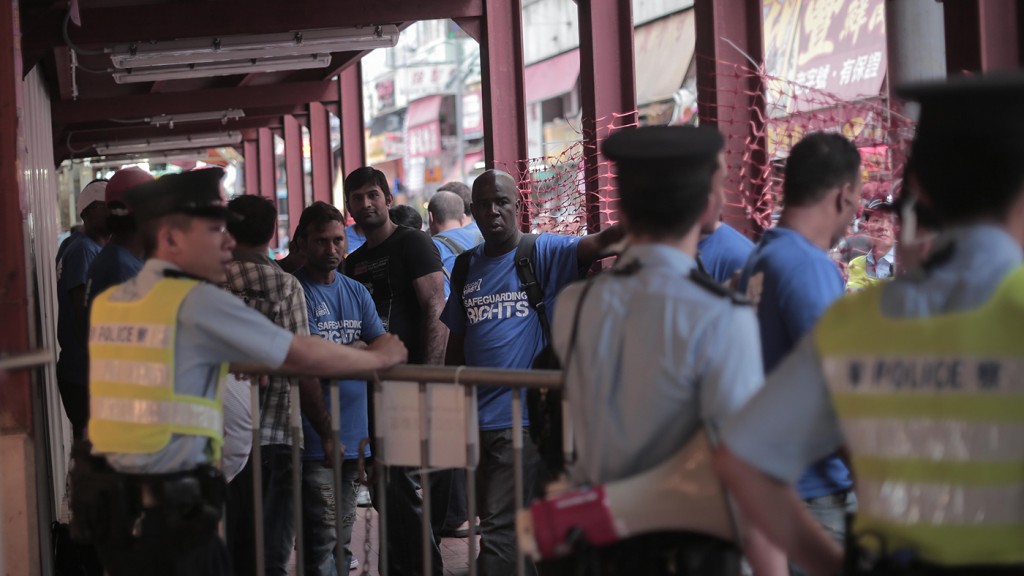
Fighting for bail against institutional prejudice
Feb 4th, 2014 | Personal Experiences | Comment
My name is Matthew and I am barrister in training doing my pupillage with a top human rights lawyer. The training is tough and challenging and frankly has been very hard work for several months already. I would like to share last week’s court experiences with you. My master and I went to a magistrate’s courts to make a bail application for our client. It was supposed to be a straightforward task and would have been simple had our client been a resident with a similar offense.
Unfortunately, our client was a torture claimant from Pakistan. His immigration status makes matters complicated as asylum seekers are generally treated more harshly and with prejudice by the courts. This gentlemen, like many refugees, entered Hong Kong illegally (which those fleeing persecution have a right to do). After being unlawfully detained for half a year, he was neither released nor sentenced, but held in remand. Before the judge emerged, as is customary, we discussed how to move forward and bail procedures with the prosecution. However, the Department of Justice (“DOJ”) prosecutor spoke rudely to my master. The barrister attempted to explain the full picture and invited the prosecutor lady not to oppose bail. It was apparent that she was deaf to both reasonableness and ignorant of our client’s rights.
After my master pushed her in open court, she started to lose her confidence. Wepolitely requested she seek instructions from her supervisor as she was floundering in deep waters. Disappointingly, after she took advice, she reiterated that the DOJ would oppose bail. When the judge invited her to speak, she regrettably stated that she opposed bail without giving reasonable explanations. I was quite surprised asshe is an experienced prosecutor and should not have made any further submissions.
I had a feeling that facing a robust defense, she was personally unwilling to oppose bail. However, civil servants often have no choice but to follow instructions from their senior. After the magistrate heard both sides’ submissions, he agreed with the defense and grant bail to our client. This was a sudden and unexpected victory that only a human rights barrister could have extracted against such pervasive DOJ discrimination against asylum seekers. Refugee rights had won the day!
The client was extremely happy and hugged family and friends after he was released. They were overjoyed as they hadn’t seen each other for six months. The client took me for lunch at a Muslim restaurant to share the joyful occasion. I felt we had done something very meaningful for them. This was a memorable experienced. I believe that public prosecutors should not blindly follow their seniors’ instructions, but think critically and assess the entire legal landscape with an open mind.
This real life court experience encourages me to fight for justice where it is denied by bigotry and discrimination. In our beloved Hong Kong there is a great need for lawyers who will fight tooth and nail for the undertrodden. When you know about social injustice, you may choose to look the other way, but you can never say that you didn’t know.
